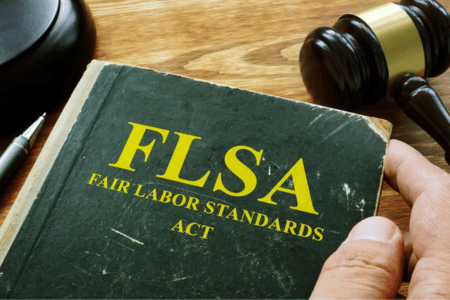How Long Can an Employer Hold Your Paycheck After Termination? A Guide

It is important to note that no provision in federal or Florida law requires your employer to hand you your final paycheck at the same time as your termination or resignation. Nor does any law impose a duty on your employer to make special accommodations to get your pay any earlier than you would have gotten it had you remained employed. Still, an employer does not have the right to keep your paycheck indefinitely.
You may have a legal cause of action against an employer if they refuse to deliver your final paycheck. This could include the right to recover any unpaid compensation and, in some cases, additional damages. However, unfortunately, holding your former employer legally liable is not always a straightforward process. To ensure you have the best opportunity to recover the maximum value of damages, it is always advisable to get help from an experienced Florida employment law attorney before taking legal action.
Federal Labor Standards Act Insights
The Federal Labor Standards Act (“FLSA”) is an important federal law that discusses various topics related to employee pay. Most notably, the FLSA establishes a federal minimum wage and describes the circumstances in which an employer must pay its employees overtime.
The FLSA also discusses an employee’s right to receive their final paycheck upon leaving a company. Under the FLSA, employers do not have to provide a former employee their final pay immediately upon termination. Moreover, the FLSA does not require an employer to pay an employee within a specific period of time following the separation.
Instead, the FLSA does require employers to pay former employees no later than the next regularly scheduled pay period. For example, suppose you are paid monthly on the first of each month but were terminated on September 2. Your employer can wait until October 1 to pay you your final paycheck and still be in compliance with the FLSA.
Florida Final Paycheck Laws
There is also no specific state law regarding final paychecks in Florida. While there are laws that require employers to pay their workers a minimum wage, Florida’s laws are silent on when your last paycheck must be paid to you. As a result, the provisions of the FLSA apply, and your employer must provide you with your paycheck no later than by the next regularly scheduled payday.
Behind the Delay: Can an Employer Hold Your Paycheck for Any Reason?
Despite the clear directions of the FLSA requiring employers to pay their employees their final paychecks no later than the next regularly scheduled payday, an employer may still lawfully withhold some or all of an employee’s final wages for limited reasons. Before determining if such withholding is legal, your employment law attorney will want to know why you did not receive your final paycheck.
State and Federal Taxes
An employer can withhold state and federal taxes from your paycheck. Because you earned your wages while still an employee, your employer is legally obligated to withhold these amounts from your paycheck.
Income Withholding Orders
Suppose your employer was given an income withholding order for child support or another obligation. In that case, they must honor that obligation with your last paycheck, even if you are no longer an employee when you receive payment.
Money-Owed with Prior Authorization
Suppose you owe the employer money and have given them prior authorization to withhold part or all of your paycheck to pay them back. In that case, the employer may do so in accordance with that agreement. The employer should first tell you of the amount you owe and what it is for before asking for your authorization. Notably, they may only withhold your paycheck for this reason if you agree for them to do so.
Inability to Deliver the Paycheck
An employer may hold onto your final paycheck if they attempt to deliver it to you but are unsuccessful. After making reasonable attempts to reach you, they can keep the paycheck on the premises until you pick it up or give instructions on what to do with it.
Unlawful Reasons for Paycheck Withholding
An employer cannot withhold your final paycheck for just any reason, especially not as an act of discrimination or retaliation.
For example, if the employer fired you because you announced you were pregnant, not only would your termination be unlawful, but it would also be unlawful for the employer to withhold your paycheck for this reason.
You are also entitled to your final paycheck even if you violated a company policy. An employer cannot keep your final paycheck as a form of punishment or discipline.
It is also unlawful for an employer to withhold your final paycheck because you damaged property, stole from the company, or failed to return equipment or uniforms. While they may be able to proceed with other types of legal actions against you, the employer cannot withhold your final paycheck for these reasons.
Your Rights and Recourses
The FLSA protects your right to be paid for all of the time you have worked for an employer. However, it is easy to confuse or misunderstand your rights under the law when your employment relationship ends. Knowing the protections afforded to you by federal and state laws is critical to ensuring you are treated fairly.
The rights you have as a former employee include the right to demand that your employer pay all of your final wages on the payday immediately following your separation. If your employer fails to pay you despite your demand, you can bring a civil action against them to recover the money you are owed—and possibly additional damages.
Common Misconceptions
One of the most common misconceptions by employees is that they are entitled to receive their final paycheck immediately upon termination. However, neither the FLSA nor any Florida law requires employers to do this. No law requires your former employer to pay you more expeditiously than their other employees.
It is also a misconception to believe that your employer has the right to withhold your final paycheck for misconduct or other disciplinary reasons. Some unscrupulous employers may attempt to convince you they have this right. However, they have no right to withhold your final paycheck except under limited circumstances, such as some of the circumstances mentioned above.
Taking Action: Steps to Recover Withheld Pay
If you do not receive your final paycheck, you should promptly contact the employer—preferably by writing. It is possible they have made an honest mistake, or there is some unavoidable delay in processing your paycheck.
Your relationship with the employer can help inform whether you should give them additional time to deliver your final paycheck. If you do not receive your paycheck even after contacting the employer, you should consider hiring an attorney to send a certified demand letter to the employer. If this still does not result in receiving your paycheck, and 30 or more days have passed before you are paid in full, you may need to pursue legal action against the employer. You may be able to recover the amount you were originally owed and a penalty for additional damages. You may also be entitled to recover your attorneys’ fees that were incurred while bringing the action.
Frequently Asked Questions
When it comes to your final paycheck, questions are common. Some of the most frequently asked questions about getting paid after separation from a company are included below.
How Does My Employer Pay My Final Paycheck?
An employer can choose how to deliver your final paycheck so long as they do so by the next payday after your separation. If your paychecks were usually directly deposited, some employers will do the same for your last paycheck. Others will issue you a paper check regardless of how you received the other payments.
Can I Immediately Sue if My Last Paycheck Arrives Late?
Not necessarily. You and your attorney should give the employer reasonable time to comply before bringing formal legal action. Legal action is warranted once 30 days have passed since you made your demand for payment or if your employer announces they are withholding your pay for an unlawful reason.
Can My Employer Keep My Final Paycheck?
Yes, but only in limited circumstances such as those mentioned above. These situations include if you have previously agreed in writing to allow the employer to keep your all or part of your paycheck as payment for damages or unreturned property. Your employer can also hold your paycheck if they tried but failed to deliver it to you. In most all other situations besides those described above, the employer should deliver your paycheck.
The Role of Employment Law Attorneys
Confronting an employer over your final paycheck can be intimidating. An employment law attorney can provide several services that make asserting your rights easier and less stressful. Your attorney can:
- Review your situation and ascertain if you are entitled to your final paycheck
- Make a formal demand for your final paycheck to the employer
- Discuss the law with the employer and correct any legal misunderstandings the employer might have and/or
- File legal action against the employer and seek compensation in court
Employment law is complicated and consistently changing. Failing to exercise your rights or trying to exercise legal rights you do not have can lead to not only not having your final paycheck but also a lot of frustration. For this reason, hiring the right employment law attorney to guide you through this unfamiliar terrain is helpful in achieving a positive outcome.
Seeking Legal Advice
It is clearly important to understand how long an employer can hold your paycheck after termination. If you have been terminated or quit your job in Florida and have yet to receive your final paycheck, contact the unpaid wages attorneys at Wenzel Fenton Cabassa, P.A. We have decades of experience standing up for employees against abusive employers who cut corners and avoid their legal responsibilities. We will help you pursue the payment and justice you deserve. Schedule a free evaluation today.
Please Note: At the time this article was written, the information contained within it was current based on the prevailing law at the time. Laws and precedents are subject to change, so this information may not be up to date. Always speak with a law firm regarding any legal situation to get the most current information available.
Related Posts
Recent Posts
- False Claims Act Retaliation & Your Rights
- Fired for Being Pregnant? 5 Situations When You Should Call an Employment Lawyer
- Can My Boss Take My Tips? The Laws of Tip Ownership
- What Does “Meets FCRA Requirements” Mean?
- Can Your Employer Contact You While on Medical Leave? Know Your FMLA Rights in Florida
Contact Us

FREE HELP GUIDES
Dealing with unpaid wages, discrimination or wrongful termination? Get the information you need to protect your workplace rights. We offer employment law resources to help you fight for workplace justice.





